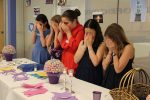Grade 6 students from Vancouver Talmud Torah – Sophie Chelin, Ava Abramowich, Sayde Shuster, Ruth Nahmad and Rachel Seguin – do the blessing over the candles at an interfaith Shabbat dinner on May 6. (photo by Jennifer Shecter-Balin)
The joy of learning, the excitement of meeting new people, the comfort of community, the satisfaction of a job well done. All of these energies filled the room at Congregation Beth Israel on May 6. And, while that Shabbat dinner marked the culmination of Vancouver Talmud Torah’s Grade 6 Term 2 Tikkun Olam course, it seemed like a beginning as well.
With the knowledge and relationships gained and curiosity and compassion further engrained, these students now have an even more solid foundation from which to carry on their interfaith connections and broaden their experiences beyond the Belief project.
The initiative of Jennifer Shecter-Balin, director of admissions and communications at VTT, who guided the students with Grade 6 humanities and tikkun olam teacher Meghan Davey, the project was inspired by Oprah Winfrey’s seven-part Belief series.
Every week, students watched an episode of the series, explained Shecter-Balin in an email to the Independent. They then “completed related assignments and activities to both deepen their own connection to Judaism and broaden their understanding of other world religions and belief systems.”
“Each week, we journeyed across the globe to learn about different streams of Judaism, Christianity, Islam, Hinduism, Sikhism and other non-traditional beliefs systems,” she explained to those gathered on May 6. “In addition to gaining further grounding in their Judaism, our students expanded their perspectives and worldviews through learning about myriad different spiritual practices, rituals and beliefs.”
“Throughout the term,” added Davey, “we broadened our vocabulary and learned terms such as monotheism, agnosticism and atheism…. We debated the merits of arranged marriages; we compared the divinely inspired versus the scientific; and we discussed the concept of miracles and what constitutes one. But most satisfying was the fact that the students all agreed that being alive and having one’s health is indeed miraculous.”
Davey also noted that, “They have learned to identify similarities across the religions – the importance of water for purification in so many traditions, for example – as well as significant differences between the major world faiths.”
For the course’s final assignment, students had to interview someone of a faith other than Judaism and then write about that person’s beliefs and influences.
“For many students, this was their first time ever interviewing an adult and someone of a considerably different background to them,” said Shecter-Balin.
The result is a nicely designed spiral-bound book of essays on the 40 interviews conducted. A copy of the book was placed at every Shabbat table and Shecter-Balin invited guests – the students’ families and many of the interviewees – to read through it.
“Like us,” she said, “you’ll learn about a host of beliefs, practices and unique life experiences, and you’ll read our students’ enthusiastic reflections about this assignment. Most importantly, their hearts and minds have further opened without compromising the integrity of who they are or where they’re from. In fact, we believe it will only serve to strengthen their identity.”
For many of the guests, the dinner was their first time in a synagogue and their first time attending a Shabbat dinner. Sharing this experience and more about Judaism, said Shecter-Balin, is a way to continue to build bridges of understanding. “This, we believe, is tikkun olam, or the Jewish commandment to repair the world,” she said.
Davey thanked all the parent volunteers who helped prepare the meal with Shlomo and Hagar Yekutieli; VTT head of school Cathy Lowenstein and assistant head of school Jessica Neville “for their support with this initiative and trusting us to think a bit outside the box”; Ellen Wiesenthal, VTT’s director of curriculum and programming, who led everyone in a few Shabbat songs after the blessings; and Beth Israel’s Gaynor Levin, for her help in planning and organizing the dinner.
Lowenstein said a few thanks of her own, including to Beth Israel Rabbi Jonathan Infeld for being so welcoming. She also introduced Rabbi Marc Kasten and his family, who came to Vancouver for the weekend. Kasten – who is currently at Temple Beth Am Day School in Miami – will start in August as VTT’s new school rabbi and director of Jewish life and learning. He spoke about some of the Shabbat rituals before they were fulfilled, mainly by the students: the singing of L’Cha Dodi, the candlelighting, the blessing of the children by their parents, the Kiddush and Hamotzi.
The next step in the project, Shecter-Balin said, is “to send a copy of the book to Oprah along with notes from the students sharing their personal reflections of watching the video series.”

